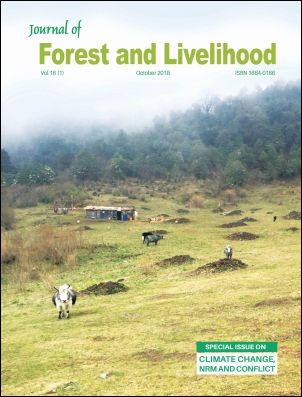Halting Forest Encroachment in Terai: What Role for Community Forestry?
DOI:
https://doi.org/10.3126/jfl.v16i1.22880Keywords:
Collective action, community forestry, illegal settlements, tenure, TeraiAbstract
This paper highlights the lessons of using adaptive learning in community forestry that effectively help to resolve forest based conflicts in Terai region of Nepal. The paper is based on a three-year action research carried out in Terai. Qualitative methods including participatory rural appraisal tools and documentation of engaged action and reflections were used. Methods and tools that largely fall under adaptive learning were deployed. The field data was complemented by review of secondary data and literature on environmental history of Terai. We found that policies on land and forest in Terai for the last fifty years have induced and aggravated conflicts over access and control between state and communities and also within diverse groups of local communities. These conflicts have had serious negative impacts on sustainable management of forests and on local people’s livelihoods, particularly resource poor and landless people. Centralised and bureaucratic approaches to control forest and encroachment have largely failed. Despite investing millions of Rupees in maintaining law and order in forestlands, the problem continues to worsen often at the cost of forests and local communities. We found that transferring management rights to local communities like landless and land poor in the form of community forestry (CF) has induced strong local level collective action in forest management and supported local livelihoods. Moreover, adding adaptive learning, as a methodological tool to improve governance and enhance local level collective action significantly improves the benefit of CF. It implies that a major rethinking is needed in the current policies that have often led to hostile relationships with the local inhabitants- particularly the illegal settlers. Instead, transferring forest rights to local communities and supporting them through technical aspects of forest management will strengthen local initiatives towards sustainable management of forests.
Downloads
Downloads
Published
How to Cite
Issue
Section
License
CC-BY-NC: This license allows reusers to distribute, remix, adapt, and build upon the material in any medium or format for noncommercial purposes only, and only so long as attribution is given to the creator.





